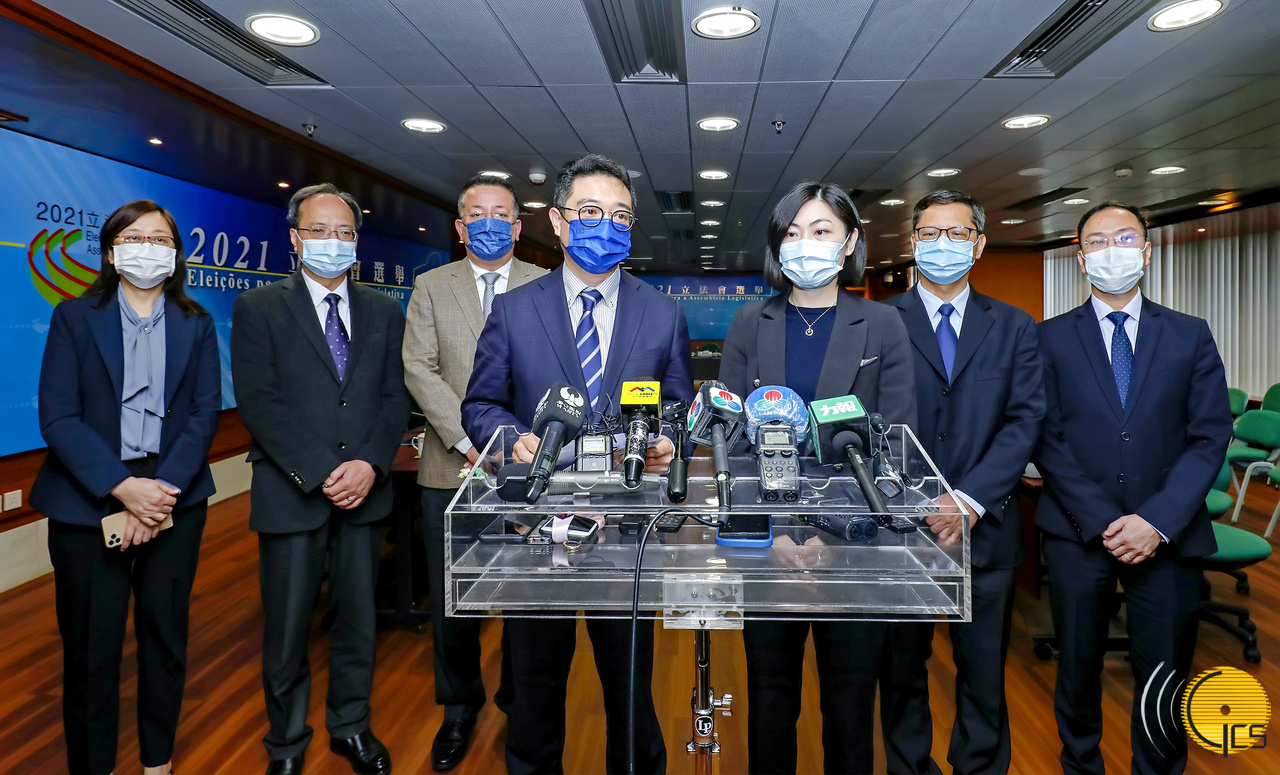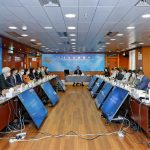 The Electoral Affairs Commission for the Legislative Assembly Election holds a meeting with representatives of the Commission Against Corruption.
The Electoral Affairs Commission for the Legislative Assembly Election holds a meeting with representatives of the Commission Against Corruption.
The Electoral Affairs Commission for the Legislative Assembly Election and the Commission Against Corruption (CCAC) will launch jointly, tomorrow (9 March), a telephone hotline to handle any complaints that might arise relating to the 2021 Legislative Assembly Election, which is set to take place on 12 September.
The Chairman of the Electoral Affairs Commission for the Legislative Assembly Election, Mr Tong Hio Fong, and Deputy Commissioner of the CCAC, Ms Ao Ieong Seong, briefed reporters on the topic today, after a meeting of officials.
The hotline (+853 2899 7733) would be available on a 24-hour basis. Members of the public also had the option of lodging any election-related complaint via www.ccac.org.mo. Once a complaint was received, the CCAC would analyse whether the matters raised were within the competency of either the Electoral Affairs Commission or any other public departments. If the latter applied, the CCAC would forward such a complaint – in a timely manner – to the relevant department for their follow up, added Ms Ao Ieong.
The CCAC would handle in line with the requirements of law, any complaint related to the forthcoming election, in order to ensure a fair, just and clean election, Ms Ao Ieong added.
Following the publication today of the Legislative Assembly election date, i.e., 12 September, the Commission had decided – in line with the Legislative Assembly Election Law – the schedule for election-related events, Mr Tong said.
From 11 March, the Commission would make available application papers for those wishing to form nomination committees on behalf of those seeking to contest the 2021 election. The deadline for such nomination-committee applications would be 15 June, in order for the Commission to review the legal status of nomination committees.
Each registered voter was entitled to endorse the nomination committee of only one election team, and each person wishing to sign up for a nomination committee would be required to submit a declaration, Mr Tong said.
The Legislative Assembly Election Law stipulates that only political associations and nomination committees have the right to nominate candidate lists for the process of direct election of members for the Legislative Assembly.
For directly-elected seats, a nomination committee must contain at least 300 and no more than 500 voters drawn only from the official list of natural-person voters. Regarding the indirect elections for seats in the Legislative Assembly, each nomination committee must be formed by at least 20 percent of the associations in the respective functional constituency. The official lists of natural-person voters and of those legal-person voters were both published in January.
As of 31 December 2020, there was an aggregate of 325,180 natural-person voters, representing an increase of 18,160, or 5.92 percent, compared to the number registered as of 31 December 2016. There are 813 legal-person voters, a drop from the 858 recorded in 2016.
On 24 March, the Commission would hold a seminar on the electoral process. It would be open to members of the public, including those wishing to run a campaign, in order for them to become familiar with the process.
Regarding voters currently staying overseas, the Chairman said the existing law only permitted voters to cast their ballots in person. Should such people currently overseas – that were registered as Macao voters – wish to exercise their civic duty, they were advised to pay attention to epidemic-control measures and plan their trip back Macao in a timely manner. Under current rules, people undergoing a period of medical observation after returning to Macao, were not permitted to leave the place they staying until successful completion of the observation period, Mr Tong said.
Mr Tong issued a reminder that voters must provide to the Public Administration and Civil Service Bureau, on or before 31 May, any updated information regarding a change of residential address, as each voter would be assigned a polling station based on the address held on file.
When asked by reporters, Mr Tong stated campaigning activities would only be allowed within the official campaigning period, which runs from 28 August to 10 September. The Electoral Affairs Commission would conduct close monitoring for any signs of promotional effort that might occur before the start of the official campaigning period, even if it took place after the publication of the confirmed candidate list.
The Electoral Affairs Commission added that individuals interested in running for a campaign, should respect the rules and the principle of the fairness of the election. Members of local non-governmental organisations wishing to take part in the election, should pay attention to their conduct when organising activities or providing welfare under the name of associations.
Regarding any individual wishing to become eligible to run a campaign, Mr Tong said they must pledge allegiance to the Basic Law of the Macao Special Administrative Region (SAR), and to the Macao SAR, according to the terms of the Legislative Assembly Election Law.
The Electoral Affairs Commission would review matters thoroughly before any decision to remove any person from the election process. One cause for such barring, would be if a person was deemed to have committed any acts in conflict with their legally-bound allegiance, Mr Tong said. Any individuals barred on such grounds, would have the right to file an appeal to the Court of Final Appeal against any decision by the Electoral Affairs Commission to exclude them, Mr Tong added.



